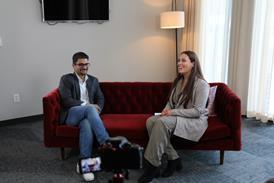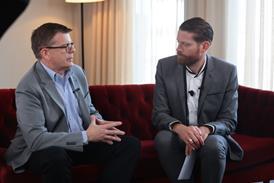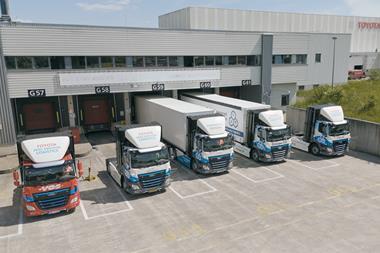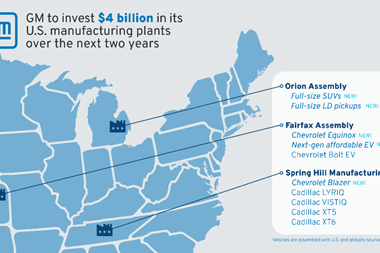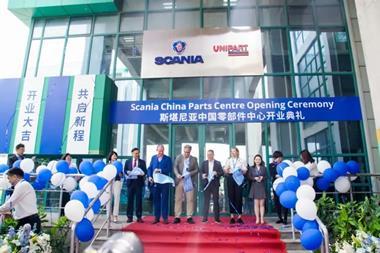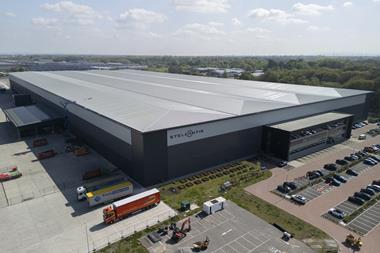 Magna International Europe has recognised three plants in its inaugural World Class Logistics awards, with Magna Slovteca, which produces mirrors, taking the top prize for a transformation project across its internal and external logistics operations.
Magna International Europe has recognised three plants in its inaugural World Class Logistics awards, with Magna Slovteca, which produces mirrors, taking the top prize for a transformation project across its internal and external logistics operations.
Magna Exteriors’ plant in Meerane, in eastern Germany, took second place in the awards for an RFID project that tracks material through production, warehousing and sequencing across multiple facilities before customer delivery. In third place, the Magna Steyr contract assembly plant was recognised for a project that uses telematics and geofencing to pinpoint truck locations, especially for those making long distance, just-in-sequence delivery to the plant in Graz, Austria (pictured).
Twelve projects were shortlisted across Magna plants and divisions in Europe, with projects covering track and trace, inventory management and packaging initiatives. The finalists and winners were judged and selected by Magna’s global logistics steering committee, which was formed last year. The steering group is led by Klaus Iffland, vice-president for global purchasing and logistics Europe, and Jörg Blechinger, director of Magna Logistics and global lead logistics, with representatives from Magna divisions including seating, exteriors, mirrors, body and chassis, powertrain (including the recently acquired Getrag transmission producer) and Magna Steyr.
The awards were presented during the Magna Logistics Day in Leibnitz, Austria, an internal meeting of Magna’s logistics executives and logistics providers.
Blechinger praised the plants and logistics divisions for their innovation and focus on ‘World Class Manufacturing’ principles, which includes lean logistics management and careful focus on training. Referring to a huge rise in logistics complexity and volume over the past decade for Magna in Europe – including an increase in weekly transports from 9,000 to 16,000 since 2005 – Blechinger said: “The way that we can manage our growing challenges in logistics will be through innovation, especially from across Magna’s decentralised divisions and plants.”
The basic criteria for the awards were each project’s financial and operational success, level of innovation, and the degree to which it was replicable and sustainable.
Change managementThe top prize for Magna Slovteca recognised the plant’s two-year project to redesign and improve its logistics, including material flow and warehouse processes, shipping incoterms, packaging and outsourcing. Milan Kalis, logistics manager for the plant, which is in Nové Mesto nad Váhom, about 100km north of Bratislava, said in accepting the award that it had been a very rewarding but sometimes difficult project.
“It has been very important to adapt people to the changes and it required a lot of communication,” he said. “There was a lot of fear about outsourcing aspects of our logistics, for example, as people worried about losing their jobs.”
According to Kalis, although the project did succeed in reducing headcount in day-to-day operations on the shop floor by around 18% while maintaining the same output, those who wanted to stay with Magna Slovteca were reassigned elsewhere within the company.
The project included changes virtually across the plant’s logistics, from using a new type of container for ocean shipping to taking control over more inbound logistics, outsourcing internal logistics processes at the plant, and using a supermarket concept for high-volume consignment parts. The supplier also worked with its logistics provider, DHL, to improve packaging management. A new IT solution to improve the visibility of production and logistics processes has also been developed and implemented together with SAP.
The better to see youSecond place was awarded to the Magna Exteriors plant in Meerane, where the company has implemented RFID labels for its bumpers that track the product through the entire manufacturing and logistics process. The label is applied to the bumpers after the moulding stage, with RFID gates passed through ahead of painting, storage, sequencing and through outbound release to OEM assembly plants.
RFID not only allows the bumpers to be tracked without manual scanning, but helps Magna to check that the correct parts are stored and moved through production. For example, the RFID verifies that the right bumper will be painted the right colour. It also signals to workers when a bumper may need to be removed from the process or scrapped.
According to logistics managers at the plant, RFID is also used to verify parts that can then be mixed into high-density racks to maximise container utilisation. An RFID gate when leaving the plant for outbound dispatch also reads parts.
Magna Exteriors worked with logistics process and technology firm Chemnitz Sigma to develop and apply the RFID solution.
Magna Steyr gained third place; at the contract manufacturer's plant in Graz, Austria, a new method for tracking trailers has been applied ahead of the plant’s new model launches, which will include the BMW 5 series by March next year, as well as a Jaguar Land Rover and a Toyota product to follow. According to Alfons Dachs-Wiesinger, head of logistics at Magna Steyr, the new models will be characterised by a significant increase in long-distance, just-in-sequence flows, in which parts are sequenced into the order they will be consumed in on the assembly line prior to delivery. Currently the plant has few such deliveries, and the change will require strong visibility of material and especially of any potential disruptions.
Magna Steyr has worked with tracking data integrator Gatehouse and with Cargopool Telematics to develop software and hardware for trailers. The tracking is then applied in real time to the trailers as opposed to the tractors, which Dachs-Wiesinger pointed out can sometimes be switched during delivery and could thus lead Magna Steyr to track the wrong equipment. Automatic messages are generated when the trucks move through specific geographic points, which allow the contract manufacturer to watch for any exceptions during transport.
“One of the advantages of the project was a very quick implementation,” he added. “We had the first trailers working with the equipment in less than four weeks, with minimal investment required.”





